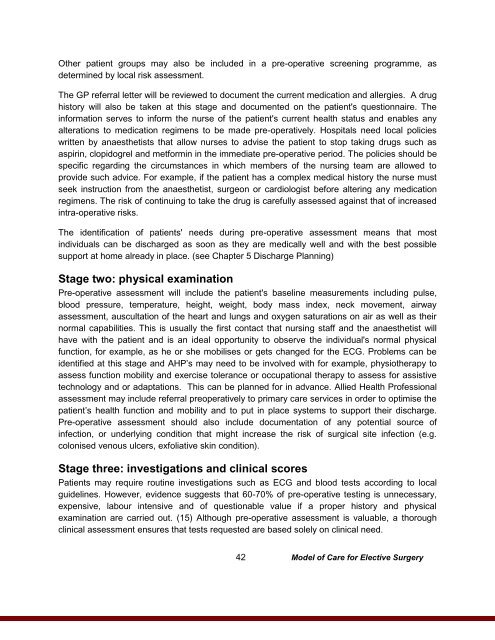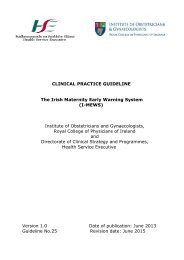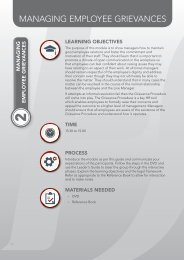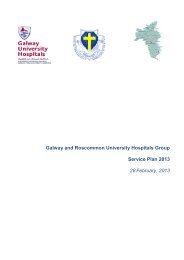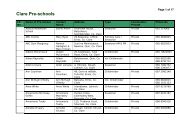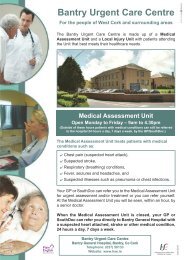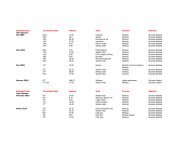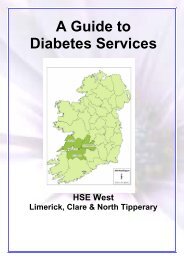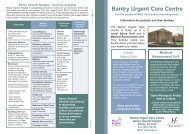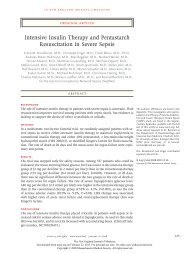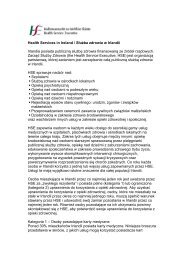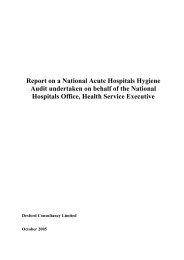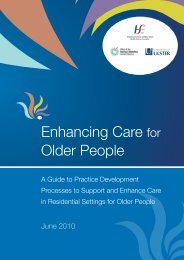Elective Surgery Programme Implementation Support Guide
Elective Surgery Programme Implementation Support Guide
Elective Surgery Programme Implementation Support Guide
You also want an ePaper? Increase the reach of your titles
YUMPU automatically turns print PDFs into web optimized ePapers that Google loves.
Other patient groups may also be included in a pre-operative screening programme, as<br />
determined by local risk assessment.<br />
The GP referral letter will be reviewed to document the current medication and allergies. A drug<br />
history will also be taken at this stage and documented on the patient's questionnaire. The<br />
information serves to inform the nurse of the patient's current health status and enables any<br />
alterations to medication regimens to be made pre-operatively. Hospitals need local policies<br />
written by anaesthetists that allow nurses to advise the patient to stop taking drugs such as<br />
aspirin, clopidogrel and metformin in the immediate pre-operative period. The policies should be<br />
specific regarding the circumstances in which members of the nursing team are allowed to<br />
provide such advice. For example, if the patient has a complex medical history the nurse must<br />
seek instruction from the anaesthetist, surgeon or cardiologist before altering any medication<br />
regimens. The risk of continuing to take the drug is carefully assessed against that of increased<br />
intra-operative risks.<br />
The identification of patients' needs during pre-operative assessment means that most<br />
individuals can be discharged as soon as they are medically well and with the best possible<br />
support at home already in place. (see Chapter 5 Discharge Planning)<br />
Stage two: physical examination<br />
Pre-operative assessment will include the patient's baseline measurements including pulse,<br />
blood pressure, temperature, height, weight, body mass index, neck movement, airway<br />
assessment, auscultation of the heart and lungs and oxygen saturations on air as well as their<br />
normal capabilities. This is usually the first contact that nursing staff and the anaesthetist will<br />
have with the patient and is an ideal opportunity to observe the individual's normal physical<br />
function, for example, as he or she mobilises or gets changed for the ECG. Problems can be<br />
identified at this stage and AHP‟s may need to be involved with for example, physiotherapy to<br />
assess function mobility and exercise tolerance or occupational therapy to assess for assistive<br />
technology and or adaptations. This can be planned for in advance. Allied Health Professional<br />
assessment may include referral preoperatively to primary care services in order to optimise the<br />
patient‟s health function and mobility and to put in place systems to support their discharge.<br />
Pre-operative assessment should also include documentation of any potential source of<br />
infection, or underlying condition that might increase the risk of surgical site infection (e.g.<br />
colonised venous ulcers, exfoliative skin condition).<br />
Stage three: investigations and clinical scores<br />
Patients may require routine investigations such as ECG and blood tests according to local<br />
guidelines. However, evidence suggests that 60-70% of pre-operative testing is unnecessary,<br />
expensive, labour intensive and of questionable value if a proper history and physical<br />
examination are carried out. (15) Although pre-operative assessment is valuable, a thorough<br />
clinical assessment ensures that tests requested are based solely on clinical need.<br />
42 Model of Care for <strong>Elective</strong> <strong>Surgery</strong>


